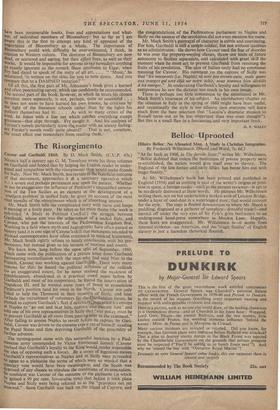The Risorgimento
Cavour and Garibaldi 1860. By D. Mack Smith. (C.U.P. 45s.) NEaaey half a century ago G. M. Trevelyan wrote his three volumes O n Garibaldi and hoped that by helping the English reader to under- stand and sympathise with the risorgimento tIm.would make friends for Italy. Now Mr. Mack Smith, less certain of the beneficial outcome of that movement, approaches it at a necessary operation which It I a severe and perhaps permanent scar upon the patient. Whether Or not he exaggerates the influence of Piedmont's unqualified annexa- ion of the Two Sicilies as an element in the development of a southern problem' in unified Italy, he gives an account of the most vital months of the risOrgimento which is of absorbing interest. Mr. Mack Smith tells the complicated story with verve and keeps it moving at a lively pace. He takes as his main theme (the work is sub-titled `A Study in Political Conflict') the struggle between Garibaldi, whose aim was the achievement of a. united Italy, and Cavour, who put the interests of the Piedmmitese kingdom first. Working in a field where myth and hagiography have often passed as history (and it is one sign of Cavour's skill that statements intended to Mislead contemporaries have often continued to mislead h:storians), Mr. Mack Smith rightly refuses to bandy conclusions with his pre- decessors, but instead gives us his version of motives and events. We learn how, long before the open split of September, 1860, Which came with the publication of a private letter from Garibaldi forswearing reconciliation with the man who had sold Nice to the Prench, Cavour was working against GaribtddiV. There were many reasons for this: he feared the political influence of the radicals (to an exaggerated extent, for he never realised the weakness of republicanism, abandoned as a practical creed years before by ,,,Garibaldi and most of his supporters), he feared the intervention of IN ,,aPoleon III, and he wanted some years of Peace to consolidate failed position (and his own) in the North. Cavour not only tailed to help the Thousand in their invasion of Sicily, and later forbade the recruitment of volunteers for the Oaribaldian forces, he Plotted to capture Garibaldi's fleet if necessLry4natructed li.s envoys Et Naples to "go out and beat him, capture and execute him" and told one of his own representatives in Sicily that "our pacy must be to Prevent Garibaldi at all costs from passing over to the continent." ,After failing to arouse Naples to revolt before its capture by Gari- baldi, Cavour was driven to the extreme cm:4.d ent of himself .nvading ,the Papal States and thin depriving Garibaldi of the poss.bility of further advance.
The turning-point came with this successful invasion by a Pied- triontese army commanded by Victor Emmanuel himself (Cavour realised that Garibaldi's loyalty to the King would render impossible the idea of opposing such a force). By a series of ingenious moves Garibaldi's representatives at Naples and in Sicily were persuaded to agree to a plebiscite the terms of which were so worded that a contrary vote would have been meaningless, and the South was „deprived of any chance to stipulate the conditions of its annexation. ,_Nct confident was Cavour of the outcome of the plebiscite cn which n,,e gained a 99 per cent. favourable vote) that before it took place tNaPles and Sicily were being referred to as the "provinces not yet annexed." Soon Garibaldi was back on the island of Caprera, and • the congratulations of the Piedmontese parliament to Naples and Sicily on the success of the revolution did not even mention his name.
Mr. Mack Smith's portrayal of character is subtle and convincing. For him, Garibaldi is still a simple soldier, but not without qualities as an administrator. He shows how Cavour used the fear of disorder to win over the property-owning classes, threw out hints of future autonomy to Sicilian separatists, and calculated with great skill the moment when he must act to prevent Garibaldi from retaining the fruits of his revolution. The idea of Italian unity had no emotional meaning for Cavour. His comment on the capture of Sicily was that "les macaronis [i.e. Naples] ne rant pas encore cuits, trials omit aux oranges qui soft (MA stir noire table, nous sommes bien decides a les manger." In underrating Garibaldi's loyalty and willingness to compromise he saw the dictator too much in his own image.
There is perhaps too little concession to the uninitiated in Mr. Mack Smith's treatment of his stibject. An introductory chapter on the situation in Italy in the spring of 1860 might have been useful, and occasionally the style is too allusive (not everyone will learn much from the bare assertion that "Lacaita's dramatic mission to Russell turns • out to be less important than was once thought"). But this is a small flaw in a fascinating and very important book.
D. P. WALEY


































 Previous page
Previous page